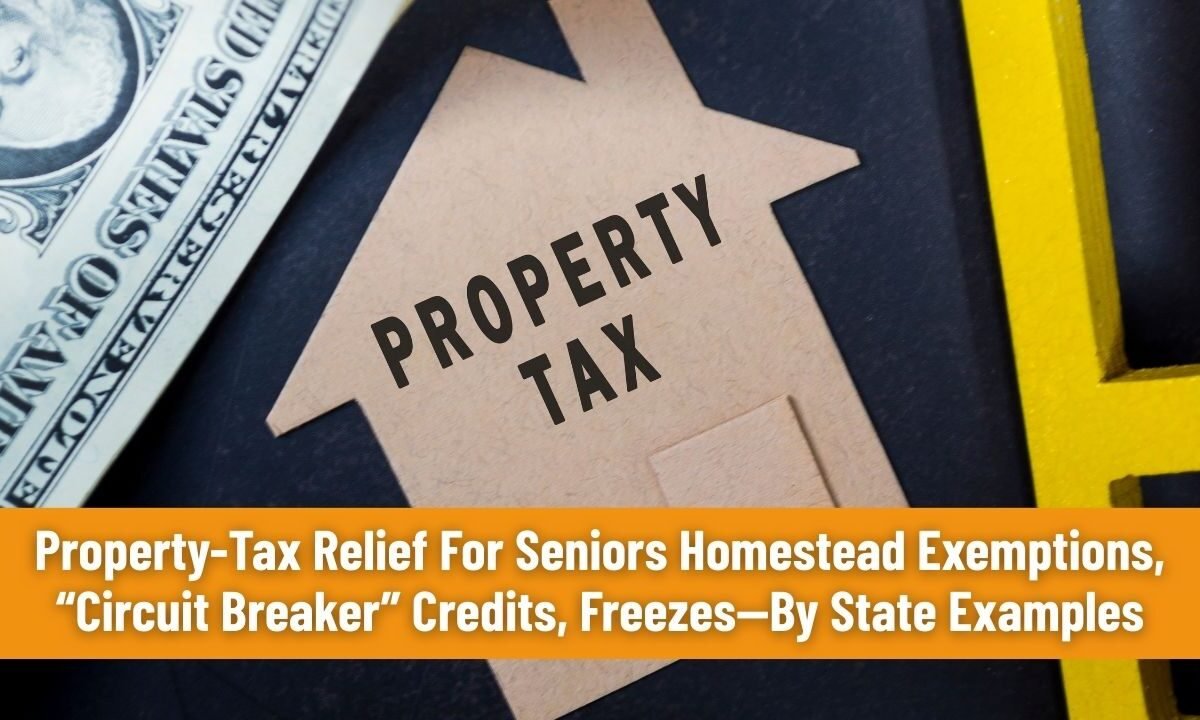Rising home values and millage rates can push fixed-income retirees into tax stress. States counter this with three tools: homestead exemptions (reduce taxable value), circuit-breaker credits (refund when taxes exceed income thresholds), and freezes/valuation protection (hold assessed value or school-tax bill steady).
Below are current, real examples for 2025.
The big three, explained
- Homestead exemptions: Reduce the taxable value of your primary residence, often with extra savings at age 65+. Texas, for example, provides a standard school-tax homestead exemption and an additional $10,000 for 65+ homeowners, plus a school-tax ceiling that caps what you pay once you qualify.
- Circuit-breaker credits: Income-tested refundable credits that “kick in” when property tax is high relative to income—e.g., Missouri’s credit (up to $1,100 for owners; $750 for renters) and Maryland’s Homeowners’ Property Tax Credit (relief based on a state formula, available up to $60,000 household income).
- Freezes / valuation protection: Hold part of your bill or assessed (limited) value steady. Examples include Texas’ school-tax ceiling at 65 and Arizona’s Senior Valuation Protection (3-year freeze of the limited property value, with county-set income limits).
Quick state snapshots (2025)
| State | Program Type | What It Does | Age | Income/Key Rule | Where to Apply |
|---|---|---|---|---|---|
| Texas | Homestead + 65+ exemption & school-tax ceiling | Extra $10,000 school-tax exemption for 65+; school taxes freeze at the amount due the year you qualify | 65+ | Standard homestead required; ceiling applies to school taxes | County appraisal district / Texas Comptroller forms |
| Florida | Homestead (up to $50,000) + Save Our Homes cap | Assessed value increase capped at 3% or CPI (2.9% for 2025); optional low-income senior add’l exemption up to $50,000 by locality | 65+ for senior add-on | 2025 income limit $37,694 in many counties; check local office | County property appraiser |
| New York (NYC) | SCHE (Senior Citizens Homeowners’ Exemption) & Enhanced STAR | 5–50% tax reduction via SCHE; Enhanced STAR adds school tax relief for seniors | 65+ | SCHE income ≤ $58,399; Enhanced STAR senior rules vary | NYC Finance / NY State Tax Dept. |
| Maryland | Homeowners’ Property Tax Credit (circuit breaker) | State credit limits tax to a % of income; relief up to household income $60,000 | N/A | Formula-based; primary residence required | Maryland Dept. of Assessments & Taxation |
| Missouri | Property Tax Credit (circuit breaker) | Refund up to $1,100 (owners) / $750 (renters) based on income & taxes/rent paid | 65+ or disabled | Income-tested; renters also eligible | Missouri Dept. of Revenue |
| Arizona | Senior Valuation Protection (“Senior Freeze”) | Freezes limited property value for 3 years; county-set income limits (e.g., $46,416 single; $58,020 multiple owners in Pinal County) | 65+ | Must be primary residence; live there 2 years | County assessor (Senior Valuation Protection) |
Pro tips to maximize savings
- Stack legally: You can often combine a homestead exemption with a circuit-breaker credit, and (where offered) a freeze/valuation cap. Check local rules.
- Watch annual updates: Income thresholds and CPI caps refresh each year (e.g., Florida’s 2025 Save Our Homes cap is 2.9%). Re-apply if your locality requires it.
- New Jersey bonus: Seniors may access Senior Freeze (PTR) reimbursements, ANCHOR rebates, and the new Stay NJ benefit (up to 50% of taxes, $6,500 cap), with a single PAS-1 form in 2025 (deadline Oct 31, 2025).
For retirees on fixed incomes, combining homestead, circuit-breaker credits, and freezes can significantly cut housing costs.
Start with your county assessor/comptroller to confirm age/income thresholds and deadlines, then apply for every program you’re eligible for—they’re designed to work together and protect your home and budget in 2025.
FAQs
Often yes—exemptions reduce taxable value while credits refund part of your bill if your income is below set limits. Check your state’s rules.
